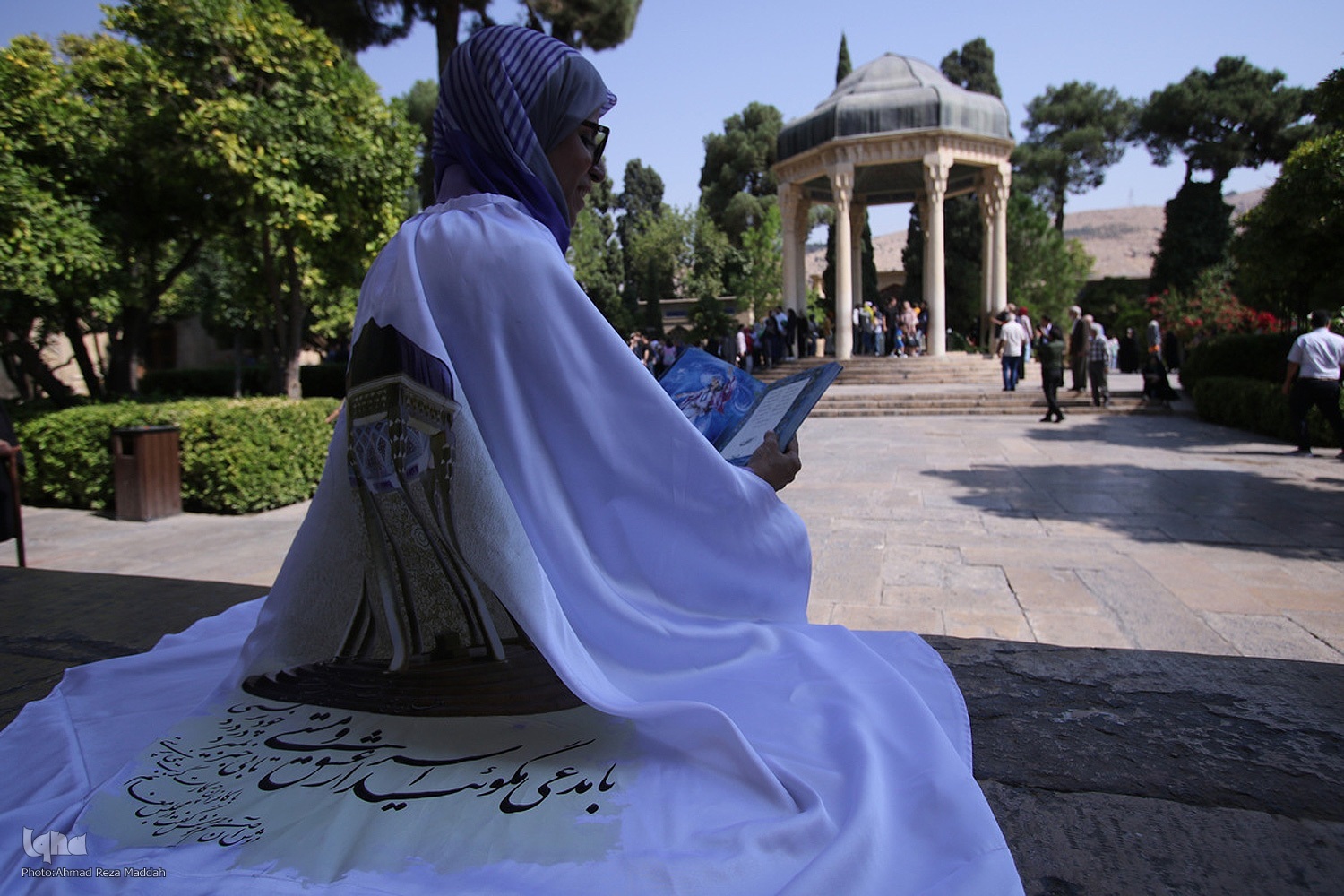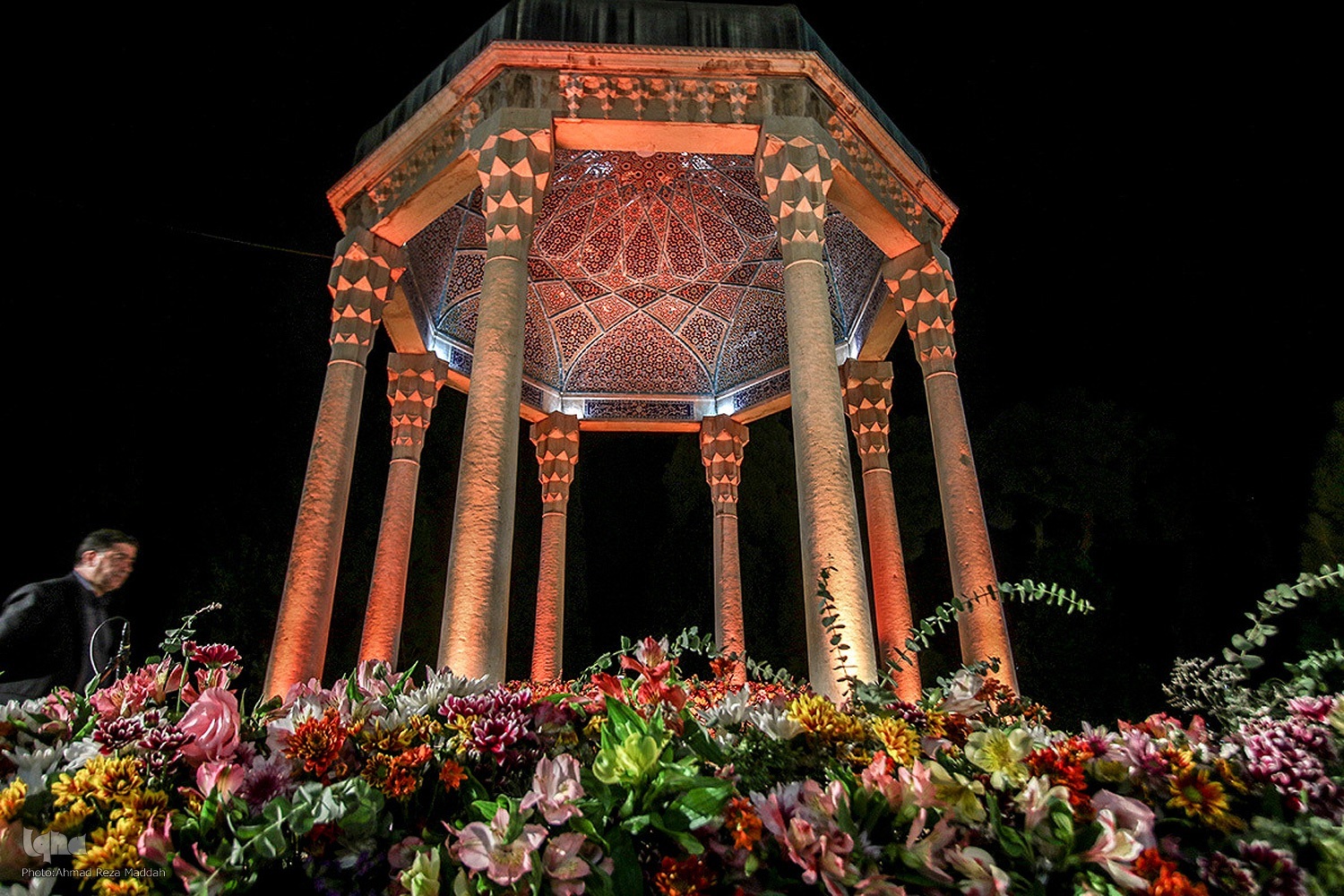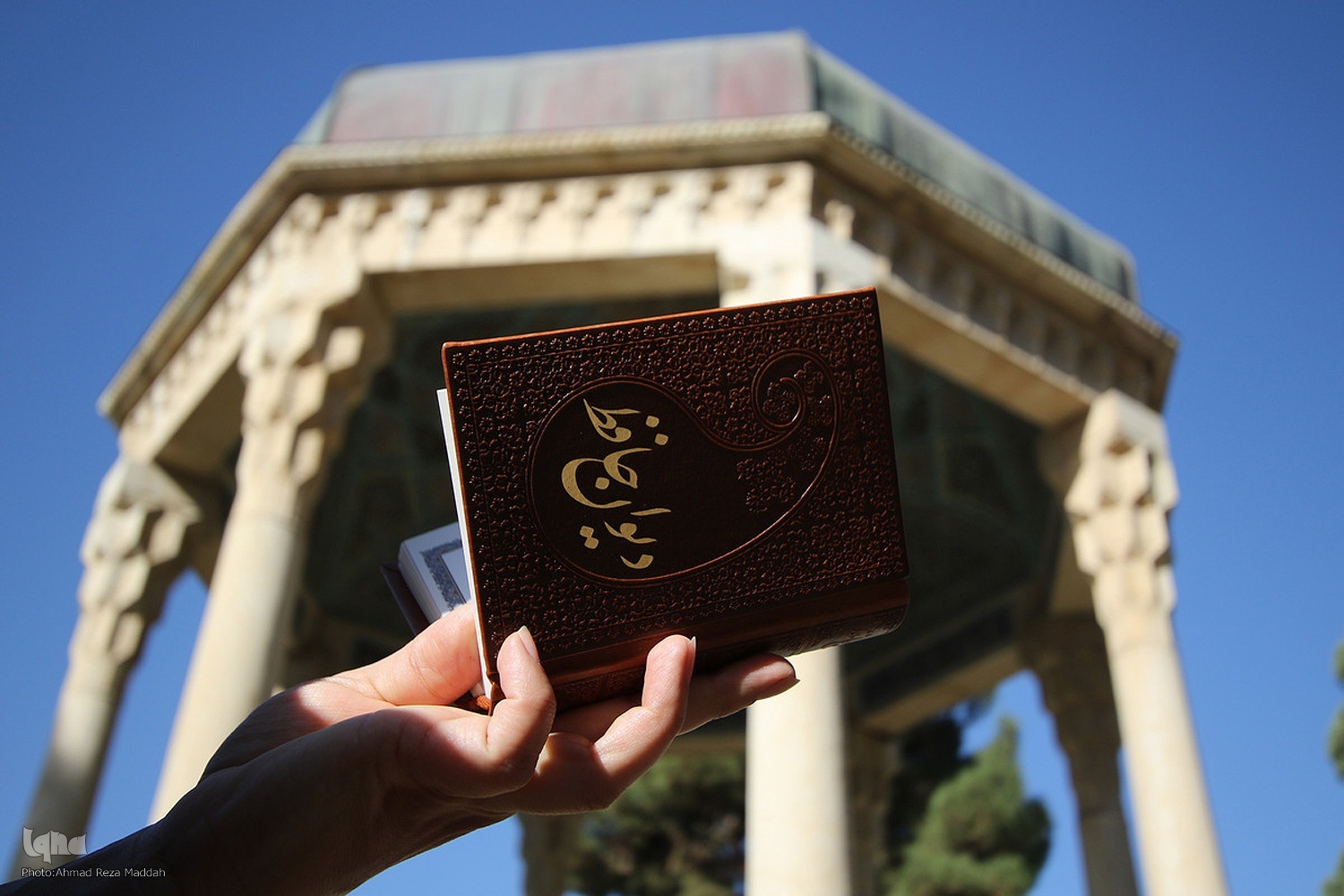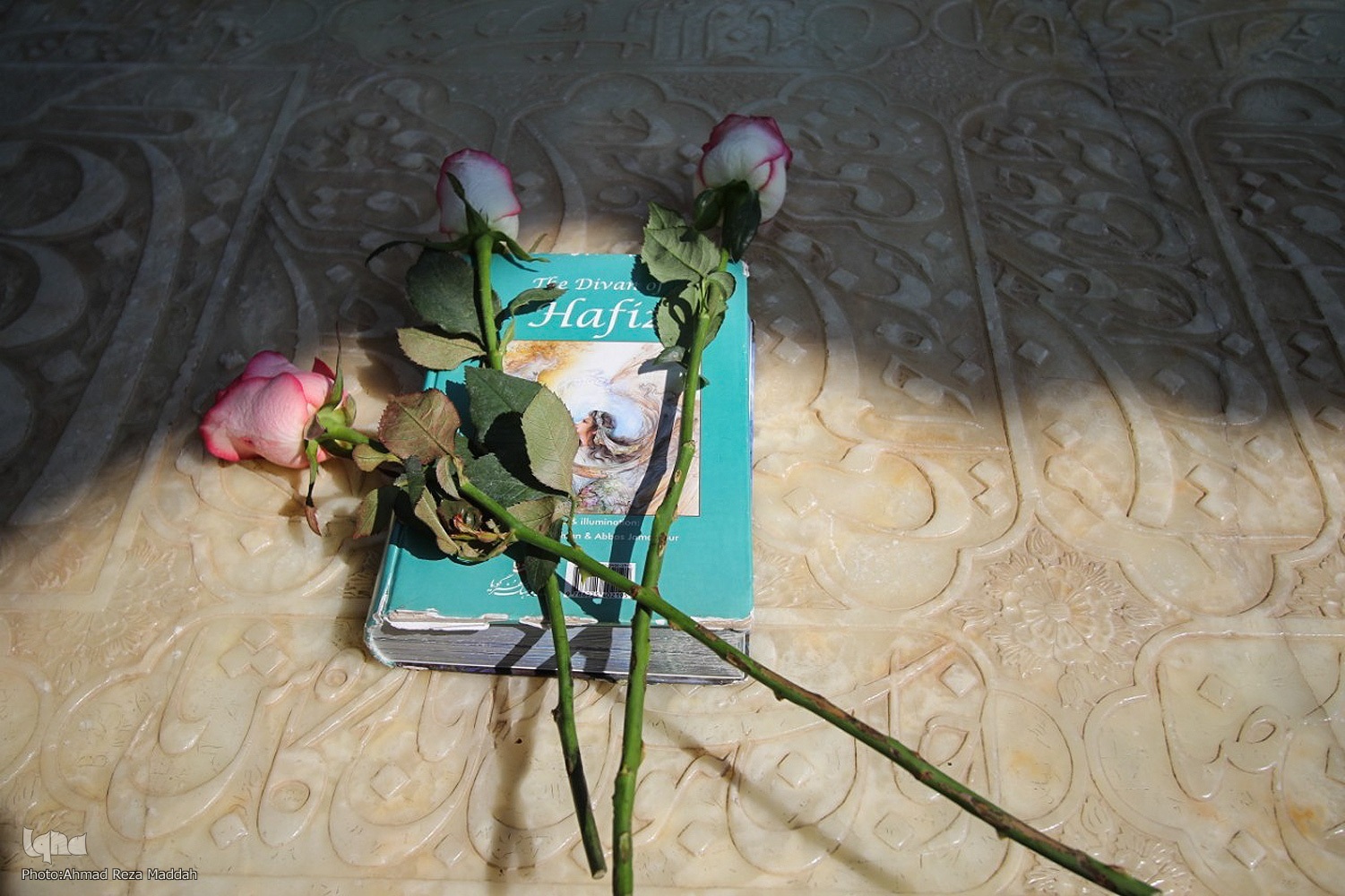Hafez and Quran: Allegory, Love and Layered Meaning

Each year, the 20th of Mehr (October 12th) in the Iranian calendar is celebrated as “Hafez Day,” a day that serves as an opportunity to reflect on the thoughts and ideas of this great Persian poet, his place in literature and mysticism, and his connection to the heritage of the Quran.
However, if we wish to take a special Quranic perspective on Hafez on this day, we must ask: How did Hafez live and compose his poetry in the light of the Quran? What is the connection between Hafez's thoughts and language and the verses of the Quran? In this article, I will attempt to use these questions as a foundation to present a clear image of the "Quranic Hafez" within a structured framework.
The Pen Name "Hafez" and Its Meaning
Among the names and titles of Khawaja Shams al-Din Muhammad Shirazi, his pen name — "Hafez" — holds special significance. Contrary to what some may think, that a pen name is simply a literary symbol, many Hafez scholars believe that the choice of the word "Hafez" was due to the fact that he was indeed a memorizer (Hafez) of the Quran and had a long-standing relationship with it.
Some manuscripts and writings emphasize that Hafez was not only a memorizer of the Quran but also a Quranic scholar, meaning that it was not enough for him to simply know the recitation, but he also delved into understanding, contemplation, repetition, and benefiting from the meanings of the Quran.
Read More:
Thus, the foundation of Hafez's relationship with the Quran lies not on a superficial level but on a deeper, more meaningful one.
Historical Affinity and Religious Life
Hafez's connection with the Quran is considered a fact. Although there are few independent written records about his personal life in many respects, his poems serve as clear evidence that his mental and emotional space was intertwined with divine revelations.

In contemporary literary and exegetical writings, it has often been stated that the spirit of the Quran flows through Hafez's poetry, and that as a poet who is both a poet and a mystic, he regarded the Quran as a source of inspiration and contemplation.
From a religious critique perspective, Hafez sometimes critiqued Quran reciters and memorizers of his time; he used irony, parables, and even sarcasm to highlight the inconsistencies he saw in the actions and words of religious leaders and superficial memorizers.
Read More:
Hafez's Structure and Style and the Influence of the Quran
In order for Hafez's connection to the Quran not to remain only on the level of meaning, we must explore how the influence of the Quran appears in the structure and style of Hafez's poetry.
Non-linear Text and "Circular" Style
One of the most prominent features of Hafez's ghazals is that the poem's text does not typically progress linearly (from start to finish with a single, unified theme), but instead follows a sort of cyclical thought process and return. This "circular" or multi-themed style allows him to touch upon various topics within a single ghazal, while still maintaining an apparent unity of the poem.
This characteristic is similar to the structure of some verses of the Quran, where not every line follows a single theme. There are shifts from one topic to another in the Quran, but there is still a logical connection between them. Some critics have viewed the Quran's flexible and composite style as a model for great poets, including Hafez.

Use of Quranic Words and Meanings
In analytical texts on Hafez, numerous instances are pointed out where Hafez has reflected or quoted Quranic words or meanings in his poetry. Some examples include:
In Ghazal 80; "Do not blame the drunken ones, O pure-hearted ascetic, / For the sins of others will not be written upon you," which echoes verse 164 of Surah Al-An'am 164.
In Ghazal 122; The line "Keep hold of the thread so it may hold you" reflects a concept of covenant and loyalty from the Quranic verses, such as verse 40 of Surah Al-Baqara.
In Ghazal 241; The mention of "the whiteness of Jacob's eyes" alludes to the Quranic story of Joseph and Jacob in Surah Yusuf.
Watch:
The references to stories such as Noah's Ark, King Solomon, Solomon's bird, and the ascension of Jesus (AS) to the heavens can all be found in some of Hafez’s ghazals, indicating a direct or indirect influence of the Quran on his poetry.
It is important to emphasize that these references mostly occur on the level of meaning — Hafez freely draws on Quranic concepts and enriches them within his own linguistic and cultural context, not simply rewriting Quranic texts.
Allegory, Symbolism, and Interpretation
One of the prominent features of Hafez’s poetry is the use of allegory and layers of meaning. What is apparent on the surface carries a superficial meaning, while what is hidden behind it holds a deeper significance. This literary technique aligns with the spirit of the Quran, where verses sometimes move from the apparent to the hidden.
Hafez often places mystical, ethical, or religious meanings behind images of love, wine, or gardens — and presents spiritual concepts through these symbols.
In this sense, Hafez is not merely an imitator but an interpreter: he intertwines meaning with mystical and poetic language to awaken Quranic verses and concepts in the mind of the listener and reader.

Themes and Motifs in Hafez from the Perspective of the Quran
When examining Hafez's relationship with the Quran from the perspective of themes, several key points emerge:
Tawhid (Oneness of God), and the Presence of the Beloved
The Quran primarily begins with an invitation to Tawhid and emphasizes the oneness of God. In Hafez's poetry, Tawhid — whether directly or associated with divine love — holds a central place. In many of Hafez’s verses, love for the beloved is interpreted in a spiritual way that can be understood as divine love. This is the bridge that Hafez uses to connect the language of love with the language of Tawhid.
Some of Hafez's verses, though seemingly directed at a lover in earthly love, subtly allude to divine love and the longing for ultimate union. This perspective on the beloved aligns with the Quranic concept of unity and divine truths.
Reminder of Servitude and Return
In the Quran, humans are portrayed as creations returning to their Creator. Hafez also refers to death, return, the transience of the world, and the reckoning after death, but he presents all of these themes in a delicate and poetic manner. What is important here is the constant reminder of death (dhikr al-māwt) in Hafez's poetry, which aligns with Quranic themes.
Verses like "Every soul shall taste death" (Surah Al-Ankabut, verse 57) are spiritually reflected in Hafez's work, illustrating the human condition and serving as a reminder of servitude and return.
Justice, Divine Generosity, Critique of the Oppressor and Hypocrite
A social theme in the Quran is the emphasis on justice, support for the oppressed, criticism of tyrants, and warnings to those who are hypocritical in the sight of either people or God.
Read More:
Hafez, in some of his verses, criticizes the hypocrites of religion — those who speak of the Quran, prayer, and religion but are devoid of divine light in their hearts. This ethical and religious critique stems from a Quranic root and shows Hafez’s sensitivity to fairness and sincerity in religion.
Mercy, Forgiveness, and Hope
The Quran frequently speaks of God's mercy and calls humans to surrender and repentance. Hafez, too, writes not only of fear and dread but also of hope and divine love. In his poetry, he writes:
"If that Shirazi Turk takes my heart in hand, / I would give him Samarkand and Bukhara for his Hindu mole."
Behind this seemingly romantic expression lies hope for mercy and, ultimately, forgiveness. This outlook is present in many of Hafez’s verses: hope for absolution, return, and the embrace of divine mercy.

Symbolism and Spiritual Myth-making
Hafez, using symbolic and mythological concepts, sometimes reimagines Quranic stories or characters in poetically intriguing ways. For example, references to Yusuf, Ya'qub, Sulayman, the bird of Solomon, or Noah's ark do not merely appear as old stories but emerge as spiritual symbols within the realm of his poetry."
In these instances, Hafez, through the language of allegory, weaves verses from the Quran into his poetry in a captivating and thought-provoking manner.
Challenges, Criticism, and Reflection
Despite the general consensus among Hafez scholars regarding the relationship between Hafez and the Quran, several critical and reflective points merit consideration:
Excessive Quranic Imposition
If every verse of Hafez is considered directly connected to the Quran, it might create difficulty in distinguishing between genuine borrowing and mere linguistic resemblance.
Some critics argue that some of these connections are only verbal similarities and do not necessarily imply Quranic reference.
Multiple Interpretations and Readings
Hafez’s poems can accommodate various interpretations and readings; this means different understandings are possible. Therefore, one cannot claim that a particular interpretation is an absolute or definitive theory.
Poet Different from Exegete
Hafez is a poet, not a specialized Quranic commentator. Hence, he is not responsible for the complete exegesis of the Quran.
His poetic expressions sometimes allow linguistic and figurative freedom that might serve as a prelude to interpretation, but he is not necessarily a commentator in the technical sense of jurisprudence or Quranic sciences.

Mystical Aspect and Influence of Sufism
Some concepts in Hafez’s poetry may not solely stem from Quranic influence but might also be shaped by Islamic mysticism, Sufism, and the religious thought of his time. Care must be taken to distinguish Quranic influence from that of other intellectual currents.
Nevertheless, the strength of these reflections lies in accepting the relationship between Hafez and the Quran as a living and dynamic issue, opening space for critique and dialogue.
Watch More:
Hafez Day offers an opportunity for renewed reflection on the literary and spiritual heritage of this great poet. However, if this reflection remains limited to the literary dimension alone, a vast part of Hafez’s essence — namely, his connection to the Quran — will remain unseen. The Quranic perspective on Hafez is not an imposed interpretation but rather a broader lens through which to perceive the depth of his thought and spirituality.
Although Hafez is a poet who speaks the language of love, within this language of love, there is also a reflection of the Quranic language. If we explore his vast collection of ghazals, we will find signs of monotheistic and Quranic teachings in almost every poem, as it has been said: "No ghazal of Hafez is devoid of monotheistic and Quranic teachings."
Just as the Quran does not condemn poetry but rather praises its beauty, truth, and message (Surah Ash-Shu'ara), Hafez in his poetry strives to depict what is in the divine verses with the language of love and mysticism. In essence, Hafez Day can be a day to renew our encounter with this dual language — love and revelation.
By Alireza Sepahvand
The views and opinions expressed in this article are solely those of the author and do not necessarily reflect the views of International Quran News Agency.



